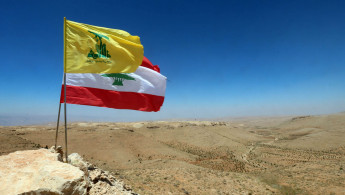US sanctions on Hizballah MPs 'humiliate' Lebanon
Ali Fayyad said the US decision "is a humiliation for the Lebanese people” and called on parliament and the government to issue a formal condemnation.
The comments were made on Lebanon's MTV news channel, according to its website, just hours after the US Treasury added Lebanese lawmakers Amin Sherri and Muhammad Hasan Raad to a terror-related blacklist, saying that the powerful Shia Hizballah movement they belong to uses its parliamentary power top advance alleged violent activities.
Also placed on the blacklist was Wafiq Safa, a top official of the Iran-allied Hizballah.
"Hizballah uses its operatives in Lebanon's parliament to manipulate institutions in support of the terrorist group's financial and security interests, and to bolster Iran's malign activities," said Sigal Mandelker, Under Secretary of Treasury for Terrorism and Financial Intelligence.
Lebanese Finance Minister Ali Hasan Khalil meanwhile tweeted that the US sanctions "concern all of the Lebanese even if they are directed at Hizballah" and are "unjustified".
After the US Treasury's announcement, Hizballah television Al-Manar said the group's leader, Hassan Nasrallah, was due to appear Friday on TV.
Nasrallah is due to address a series of Lebanese and regional issues and is expected to also discuss the latest sanctions.
The move - the first by Washington to target Hizballah elected politicians - came as the US bolsters pressure on Iran and its alleged "proxies" in the Middle East.
Terror labels
The Iranian-backed group is listed as a "terrorist group" by the United States, and has fought several wars with US ally Israel to the south of Lebanon.
But in Lebanon it is one of the country's three powerful political factions and was for decades hailed across the Arab world as the most prominent pro-Palestinian resistance group.
Hizballah fighters have backed government forces in neighbouring Syria in the civil war that broke out there in 2011.
Hizballah was established in 1982 during Lebanon's civil war, and is now a major political player in the country.
It won 13 seats out of 128 in the May 6, 2018 general election and holds three cabinet posts.
Meanwhile, Iran's parliament placed its on terrorist labels on the US military earlier this year, approving a bill that slams all US forces as "terrorist", a day after the US "terrorism" designation for Iran's Revolutionary Guard came into effect.
Out of Iran's 215 lawmakers at the session, 173 voted for the bill, with four voting against and the rest abstaining.
The bill confirms Iran's earlier label of the US Central Command, known as CENTCOM, and all its forces as "terrorist".
Any military and non-military help to CENTCOM that can be detrimental to the Revolutionary Guard will be considered a "terrorist action", the semi-official ISNA news agency said in April.
Agencies contributed to this report.
Follow us on Twitter: @The_NewArab





 Follow the Middle East's top stories in English at The New Arab on Google News
Follow the Middle East's top stories in English at The New Arab on Google News
![Netanyahu furiously denounced the ICC [Getty]](/sites/default/files/styles/image_330x185/public/2024-11/GettyImages-2169352575.jpg?h=199d8c1f&itok=-vRiruf5)
![Both Hamas and the Palestinian Authority welcomed the ICC arrest warrants [Getty]](/sites/default/files/styles/image_330x185/public/2024-11/GettyImages-2178351173.jpg?h=199d8c1f&itok=TV858iVg)
